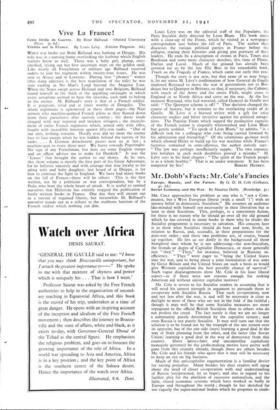Vive La France !
Writes stir la France. By Louis Levy. (Edition Pingouin. 6d.)
WHEN war broke out Rene Balbaud was bathing at Dieppe. His wife was in a nursing home overlooking the harbour which English visitors know so well. There was a baby girl, plump, rosy- cheeked, trying out her first uncertain steps on the golden sand. Like nearly all Frenchmen of military age Balbaud received orders to join his regiment within twenty-four hours. He was sent to Alsace and to Lorraine. During that " phoney " winter (this slang adjective is the best translation of the title) he was sent raiding in No Man's Land beyond the Maginot Line. When the Nazis swept across Holland and into Belgium, Balbaud found himself in the thick of the appalling onslaught in which every aeroplane seemed to bear the swastika, each tank to belong to the enemy. M. Balbaud's story is that of a French soldier. It is poignant, vivid and at times worthy of Dorgeles. The whole nightmare is epitomised in these short pages—the Nazi airmen who machine-gunned French pilots as they floated down from their parachutes after uneven combat ; the dusty roads clogged with war material and stricken refugees ; the encircle- ment of entire French regiments which, armed only with rifles, fought with incredible heroism against fifty-ton tanks. " Out of our unit, nothing remains. Hardly ever did we meet the enemy face to face except when he was hidden behind the turrets of his tanks. . . . A German detachment passes near us at last ; a machine-gun to every three men We hurry towards Poperinghe. No sign of any Frenchman, but here are some English troops and an officer advises me to make for Dunkirk." It was the ' Icarus ' that brought the author to our shores. As he says, this short volume is merely the first part of his Great Adventure, for he believes sincerely and with courage that true loyalty to his ailing wife and baby daughter, last heard of at Dieppe, is for him to continue the fight in England. We have had many books on the fall of France—there will be others. This is the first written, not by a politician or war correspondent, but by a Poilu who bore the whole brunt of attack. It is useful to remind ourselves that Hitlerism has entirely stopped the publication of freely written books in France. One day they will stream out in a torrent of regained liberty, but meanwhile M. Balbaud's narrative stands out as a tribute to the stubborn heroism of the French soldier which nothing can dim. Louis Levy was on the editorial staff of the Populaire, the Paris Socialist daily directed by Leon Blinn. His book starts with a close-up of the Front, which he visited as a newspaper correspondent just before the fall of Paris. The author then discusses the various political parties in France before the collapse, tracing their histories and giving pen portraits of their leaders. He ends by a description of events in Paris, Tours and Bordeaux and some more character sketches, this time of Petain, Darlan and Laval. Much of the ground has already been covered for us by the late Elie Bois in his remarkable book, Truth on the Tragedy of France, which came out early this year.
Though the story is not new, but that none of us may forget it, let me stress M. Levy's confirmation of how General de Gaulle implored Reynaud to move the seat of government not to Bor- deaux but to Quimper in Brittany, so that, if necessary, the Cabinet, with much of the Army and the entire Fleet, might cross to England or to North Africa and carry on the war. At the last moment Reynaud, who had wavered, called General de Gaulle and said : " The Quimper scheme is off ! " That decision changed the course of history, but it remains to the everlasting credit of de Gaulle. M. Levy is a biassed writer with a gift for crisp character studies and bitter invective against his political antago- nists. The Popular Front which sapped the productive capacity of the French nation is elegantly whitewashed and Leon Blum but gently scolded. " To speak of Leon Blum," he admits, " is a difficult task for a colleague who risks being carried forward by his admiration and friendship." Of the calamitous 4o-hour week which allowed Hitler to build up his war machine while France's factories remained in semi-idleness, the author naively says: " The law was perhaps insufficiently supple. The two consecu- tive holidays in each week doubtless proved a mistake." M. Levy says in his final chapter: "The spirit of the French people is as a whole healthy." That is an under statement. It has been


























 Previous page
Previous page